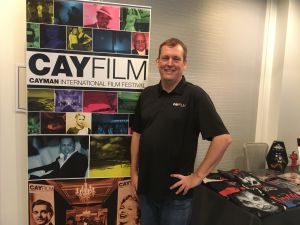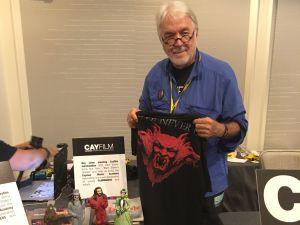CayFilm organisers focus on media academy
(CNS Local Life): The four days of movies, seminars, glitz and celebrity sightings may be over for another year, but the work started with the Cayman International Film Festival, held 30 June-3 July, will continue as organisers try to make some Hollywood magic of their own here. Calling CayFilm the first part of the plan, festival director Tony Mark is looking long term to grow a movie industry in Cayman. “The next phase is starting to work on building a media academy here,” he said.
“We’ve had meetings all weekend with some of the VIPs who have come down about starting workshops and starting really intensive weeklong courses. And pretty much everyone I’ve talked to is ready to come back.”
Noting the various workshops that were held during CayFilm, covering everything from screenwriting to acting to photography, Mark talked about the possibilities of offering these longer, more comprehensive sessions at the planned Cayman Media Academy.
“If you think you’ve learned a lot from some of the people in one hour or two hours (at the festival) wait till you spend a week with them… And we’re working on that for this year or next year,” he said.
Mark is looking to offer practical training to students, in a variety of filmmaking-related fields. Describing his vision for the school, he explained, “We want to build something that’s really practical. So, for example, someone’s a carpenter, that’s awesome. We need carpenters on the set. They need to know set etiquette. They need to know how a set works.”
These things would be taught at the academy. “And then, guess what? We now have carpenters. Same with makeup, same with electricians, so there’s a whole mess of people. So we already have a whole half of the workforce that’s needed for a film. And that’s only in a week.
“Then the gaffers, grips, the more technical positions are going to have to do a little more training. So that’s what we’re going to try to offer. We’re going to bring down really top industry professionals like Vincent Versace in photography, Gary Lucchesi in producing, the people that come to CayFilm, and bring them back down to do these weeklong intensive courses; they’ve all agreed.”
Screenwriter James V. Hart, whose work includes Bram Stoker’s Dracula, Hook, Contact and Epic, is one of those experts ready to return to teach, and says others will follow.
“We have all kinds of people who are willing to bring their expertise and their wisdom here to educate and share our experience with young filmmakers and young writers and producers and directors, young actors, whatever you want,” he said.
To help make that happen, Hart brought along memorabilia from Dracula to auction during CayFilm, including a book containing his screenplay side-by-side with hand-drawn storyboards. The items were “just taking up space in a storage space,” he explained, “but if I can use them to raise money to raise awareness for the Cayman Media Academy, they’ve got some place to start.” The auction brought in almost $1,000.
Mark spoke of the value of having someone of Hart’s calibre on board. “I’ve had filmmakers come up to me (at the festival), say ‘I’ve been writing screenplays forever. I’ve learned more in Jim Hart’s two-hour class than I have from any book or anything I’ve ever done.’
“Imagine if we get him for a week? Everyone’s going to be writing screenplays. Then we maybe bring down four or five professionals and we run the class like a set. Just shoot something and tell people where they can go, what they can do.”
He also envisions a post-production workshop. “Jeff Consiglio, who’s an Oscar-winning editor, has already said he would come down. It’s going to be huge. It’s going to be Oscar winners coming down here.”
He envisions being able to start these workshops in the fall. “Then next year we really start to design a programme that will be more geared for the local workers and then keep building it and growing it,” he said.
One of the educators supporting his efforts is Teri Schwartz, the dean of the UCLA School of Theater, Film and Television, who came to the inaugural CayFilm where she was honoured for her work as a Hollywood producer, responsible for films including Beaches and Nuts.
“She pulled me aside and said, ‘If you do something, we’ll work with you and see about making it affiliated with UCLA somehow’,” Mark recalled.
Screenwriter Paul Shrader, of Taxi Driver fame, among others, is another first-year CayFilm attendee who is willing to help. Mark recalled him saying, “Start it. I’ll come. I’ll come down and do a weeklong here in the Cayman Islands.”
Once the academy begins to grow, Mark will then turn to Schwartz. “Ideally, at some point, we bring UCLA back once we have a little bit of a footing and get them involved and figure out how we can get this certified. Then we’re good to go,” he said.
At this point, any workshops will have to be held wherever space is available, but Mark eventually hopes to have a dedicated building to house the academy. He added he has discussed the idea with Cayman Enterprise City of building the school in the new media park they are planning.
He also foresees Cayman being able to attract filmmakers to shoot on the island once the academy takes off, opening doors for local people who have been trained in all the related jobs. Mark hopes to see some smaller, low-budget films produced in Cayman in a few years, with big-studio movies to follow down the line.
Hart looks at CayFilm as an important steppingstone for the academy. “This festival has an outcome… so we can leave a legacy. That legacy is something that most film festivals don’t have. You have an opportunity to invest in the future of filmmakers in your island, and those of you around the world who come here share in that.”





Low-budget non-union films is all they’ll get without proper crew certifications, and the best crews are unionized. Even if they can get basic certifications through a Cayman academy, Caymanians would have to migrate for employment experience, putting in many hours for them to be considered qualified by the industry. Then, upon their return, how are they ensured adequate compensation, if they’re not allowed to join a union? If a unionized film project sets up in Cayman, wouldn’t they have to bring their own crew?
CI Government could certainly do more to attract productions: cash rebates, infrastructure services, discount Cayman Airways, and other incentives are needed.